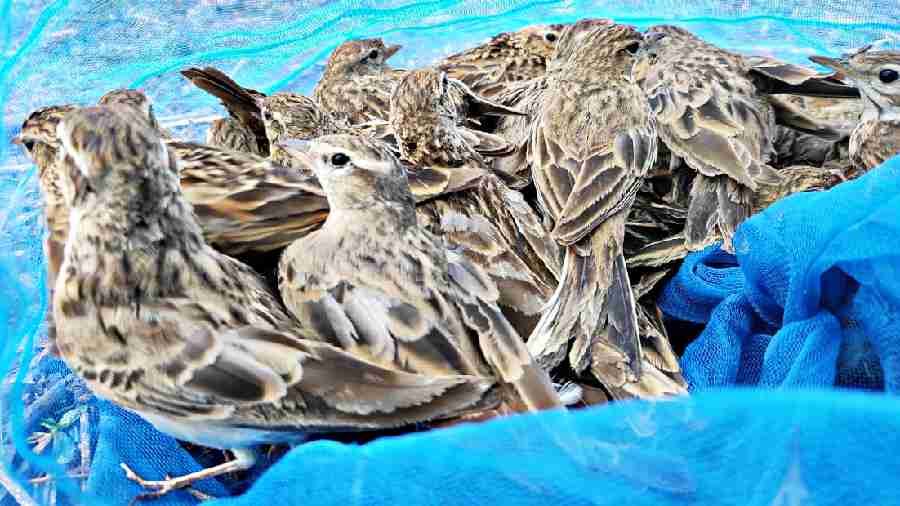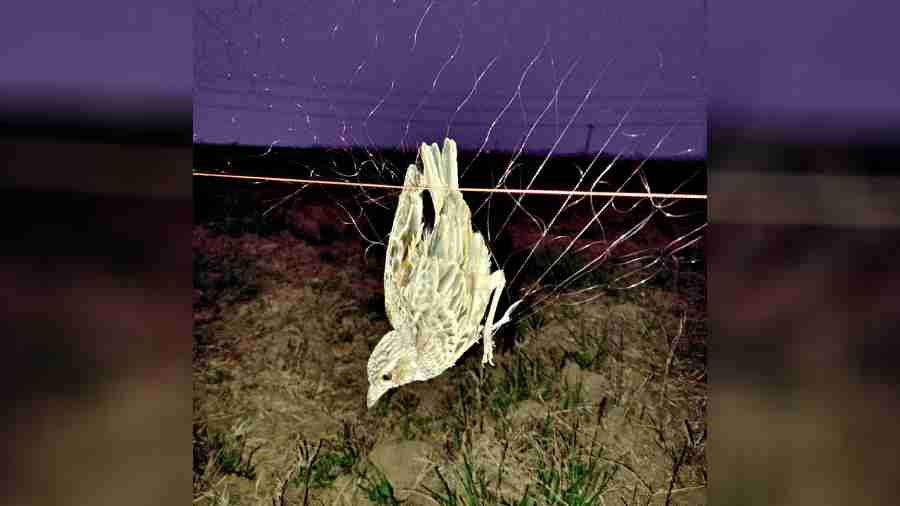The arrest of two men from a Murshidabad village has busted a racket of bird poachers, said foresters and environmental activists.
Manjur Sheikh, 57, and son Minarul, 28, were picked up from their house in Khargram block during a raid — by a team of police and forest department officials and members of a Kolkata-based NGO — on Saturday night.
Twenty-four larks — 17 short-toed larks, six oriental skylarks and one Bengal bush lark — were found inside a chicken pen in the house.
The first two are migratory birds that come from central Asia to escape the harsh winters of their breeding grounds, said birdwatchers.
“Twenty-four birds have been rescued and two persons arrested. The birds are protected under Schedule IV of the Wildlife Protection Act, 1972,” said Pradip Bauri, divisional forest officer of Murshidabad.
The district has become a killing field for these small passerine birds, called bagari in local parlance.
Short-toed larks typically stay in flocks and feed on insects in agricultural fields, a characteristic which makes them vulnerable to indiscriminate hunting. Poachers in Murshidabad and Birbhum become active during winter and set up continuous tracts of mist nets to capture the flocks in one go.
Sound and light sources are placed near the nets to ensure that more bugs and insects aggregate near the nets at night so that the birds get drawn to them for food. To ensure capture of as many birds as possible, the poachers also carry high-beam torches at night to stun the birds and lead them into the nets.
The trapped birds are then commercially sold for meat, a delicacy for many.

The same night the team rescued two dozen larks from a house in the area. A man and his son were arrested from the house for allegedly poaching birds. The majority of the rescued birds are short-toed larks, oriental skylarks and Bengal bush larks. While the first two are migratory birds, the last is a resident bird, said birdwatchers. Many migratory birds are trapped and butchered for their meat, considered a delicacy by many, said animal lovers.
“Based on a tip-off, we contacted the forest department and Khargram police station. The house was raided around 9.20pm. We found 17 short-toed larks, six oriental skylarks and one Bengal bush lark hidden inside a chicken pen. The hunters are habitual offenders and part of a larger group,” said Meghna Banerjee of Human and Environment Alliance League (HEAL).
The NGO is collaborating with the Wildlife Trust of India to curb poaching of birds in West Bengal.
Sujan Chatterjee, secretary of the Birdwatchers’ Society, said the arrests were significant because poaching of larks was rampant in Murshidabad.
“Short-toed larks and oriental skylarks usually come from southwest Mongolia and Tibet. Murshidabad, which has several wetland habitats, is an ideal destination for them. They start coming from October and this is the time for their return,” he said.
“They are easy targets because they fly in large flocks. There is a robust demand for their meat in Murshidabad. Many eateries sell it on the sly,” said Chatterjee.
“Our team has been monitoring the poaching activities relating to short-toed larks for the last two months,” said Suvrajyoti Chatterjee, secretary of HEAL.
Their findings suggest the birds are sold alive for Rs 20 to 30 apiece and Rs 300 to 350 a dozen in the local markets, he said.
Manjur and Minarul were produced in a court, which sent them to judicial custody till March 10, police said.
Their conviction can lead to a three-year jail term and a fine of Rs 25,000, said a forest official.
